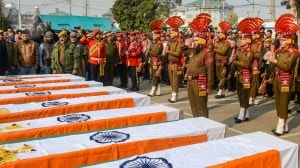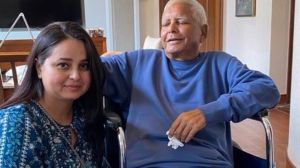Two rebel helicopters downed near Brega: Libya
Two rebel helicopters violating the no-fly zone were shot down by the Gaddafi regime in Brega.
Two rebel helicopters violating the no-fly zone over Libya were shot down by the Gaddafi regime in the Brega region in the east,deputy foreign minister Khaled Kaaim has said. “The insurgents used two helicopters that were shot down in the Brega region,” Kaaim told a news conference here last night.
Asked if the choppers had been downed by the army loyal to Muammar Gaddafi,he replied that they had.
Kaaim hit out at the NATO forces in charge of applying Security Council Resolution 1973 imposing the air exclusion zone over Libya,saying: “NATO on Saturday permitted then rebels to violate this resolution and use combat helicopters.”
Claiming that NATO was siding with the rebels,Kaaim went on: “Our question to NATO: does this resolution concern only the Libyan government or the two sides?”
A journalist on Saturday saw a Libyan military helicopter bearing the rebel colours flying at very low altitude towards the front in the Ajbabiya region of east Libya.
The international coalition has since March 19 imposed a no-fly zone over Libya under the UN resolution adopted on March 17. The rebellion against Gaddafi’s regime started in mid-February.
Meanwhile,African Union mediators on Libya on Sunday reiterated their appeal for “an immediate end to all hostilities” and proposed a transition period to adopt reforms in the insurrection-hit country.
The panel of five African leaders chosen by the EU to act as mediators decided to go along with a roadmap adopted in March which calls for the end to hostilities,”diligent conveying of humanitarian aid” and “dialogue between the Libyan parties”,it said in a statement.
The panel was to go to Libya later. Headed by Mauritanian President Mohamed Ould Abdel Aziz,it had already called for an “immediate end” to hostilities at a first meeting here March 19 and 20.
The statement said they also intended to propose “inclusive management” of a transition period aimed at adoption and setting up of “the political reforms needed to eliminate the causes of the present crisis.”
This should be done taking into account “the legitimate aspirations of the Libyan people for democracy,political reform,justice,peace and security.”
Further,in an appeasement move,a draft constitution under preparation for four years will be submitted to the Libyan people at the end of a crisis that has raged since mid-February,the head of parliament said.
Mohamed Zwei,head of the General People’s Congress,said”The draft was given to us recently. We have a legal committee that must examine the text before submitting it to the Basic People’s Congresses” (local parliaments) as laid down in leader Muammar Gaddafi’s theory of “people’s power.”
“The BPCs will revise the articles of the constitution and carry out amendments as desired once the situation in the country calms down,” he added.
On February 21,a few days after the insurrection began,Gaddafi’s son Seif al-Islam had said the parliament would meet shortly to decide on a new penal code and new laws giving more freedom to the press and civil society,as well as “starting a dialogue on a constitution.”
The Libyan government formed a judicial committee at the end of 2008 to examine a text drawn up by the Gaddafi Foundation headed by Seif al-Islam.
Ibrahim Moukhzam,committee member and expert in constitutional law,told a press conference that it would be a “modern constitution” inspired by “dozens of European and Third World countries’ constitutions.”



- 01
- 02
- 03
- 04
- 05



























